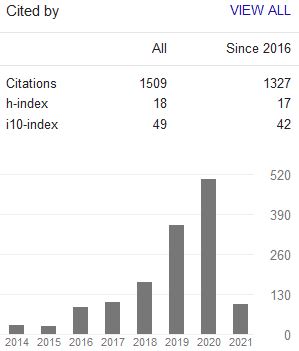SOCIAL MEDIA, MUSLIM COMMUNITY, AND THE PANDEMIC: Context-Oriented Approaches to Misinformation and Disinformation in Indonesia and Malaysia
Abstract
Keywords
Full Text:
PDFReferences
Adeni and Silviatul Hasanah. “Islam and Disaster Communication via Online Media amid the Covid-19 in Indonesia: The Case of Nahdlatul Ulama, Muhammadiyah, and the Salafism.†Al-Milal: Journal of Religion and Thought 3, 2 (2021).
Akmaliah, W. “The Demise of Moderate Islam: New Media, Contestation, and Reclaiming Religious Authorities.†Indonesian Journal of Islam and Muslim Societies 10, 1 (2020).
----------. “Reclaiming Moderate Islam in Nahdlatul Ulama: Challenging the Dominant Religious Authority in Digital Platform.†Journal of Indonesian Islam 16, 1 (2022)
Daud, Mahyuddin & Zulhuda, Sonny. “Regulating the Spread of False Content Online in Malaysia: Issues, Challenges and the Way Forward.†International Journal of Business and Society 21 (2020).
Gaol, FL; Maulana, A and Matsuo, T. “News consumption patterns on Twitter: fragmentation study on the online news media network.†Helyon 6, 10 (2020).
Gianan, Emy Ruth de Quiros. “Disinformation trends in Southeast Asia: Comparative case studies on Indonesia, Myanmar, and the Philippines.†JATI - Journal of Southeast Asian Studies 25, 1 (2020).
Graf, Arndt. “Structural Orientalism, Contested Orientalism, Post-Orientalism: A Case Study of Western Framings of ‘Violence in Indonesia.’†In Orientalism and Conspiracy. Politics and Conspiracy Theory in the Islamic World. Essays in Honour of Sadik Jalal al-Azm, eds. Arndt Graf, Schirin Fathi, and Ludwig Paul. London: I.B. Tauris, 2011.
Hamdi, Ahmad Zainul. “Constructing Indonesian Religious Pluralism: The Role of Nahdlatul Ulama in Countering Violent Religious Extremism.†Journal of Indonesian Islam 15, 2 (2021)
Hasyim, Arrazi. Teologi Muslim Puritan: Genelogi dan Ajaran Salafi. Jakarta: UIN Syarif Hidayatullah Jakarta, 2017.
Heider, Karl. Landscapes of emotions: mapping three cultures of emotion in Indonesia. Cambridge: Cambridge University Press, 2006.
Karjo, CH and Ng, A. “Hate Speech Propaganda from and against Muslims in Facebook Posts.†International Journal of Cyber Criminology 14, 2 (2020).
Kastolani, K. “Understanding the Delivery of Islamophobic Hate Speech via Social Media in Indonesia.†Indonesian Journal of Islam and Muslim Societies 10, 2 (2021).
Marin, Lavinia. “Three contextual dimensions of social media: lessons learned from the Covid-19 pandemic.†Ethics and Information Technology 23, 1 (2021).
Marin, Lavinia and Sabiner Roeser. “Emotions and Digital Well-Being: The Rationalistic Bias of Social Media Design in Online Deliberations,†in Burr C., Floridi L. (eds) Ethics of Digital Well-Being. Philosophical Studies Series, vol 140. Springer, Cham (2020).
Muslikhin and Mulyana, Deddy. “The practice of McJournalism in Indonesia's Cyber Media.†Jurnal Komunikasi – Malaysian Journal of Communication 37, 2 (2021).
Nasir, N. M., Baequni, & Nurmansyah, M. I. “Misinformation related to Covid-19 in Indonesia - Kesalahan Informasi Covid-19 di Indonesia.†Jurnal Administrasi Kesehatan Indonesia 8, 1 (2020).
Prayoga, K. “How Jokowi Communicates with the Public During Covid-19 Crisis: An Analysis of Tweets on Twitter.†Jurnal Komunikasi – Malaysian Journal of Communication 36, 2 (2020).
Rachmawati, E., Umniyatun, Y., Rosyidi, M. & Nurmansyah, M. I. “The roles of Islamic Faith-Based Organizations on counter-measures against the Covid-19 pandemic in Indonesia.†Heliyon 8, 2 (2022).
Subekti, Dimas. “Covid-19 Vaccinations Communication of Nahdlatul Ulama and Muhammadiyah in Twitter.†Jurnal Komunikasi 17, 1 (2022).
Yatid, Moonyati Mohd. “Truth Tampering Through Social Media: Malaysia’s Approach in Fighting Disinformation & Misinformation.†IKAT - The Indonesian Journal of Southeast Asian Studies 2, 2 (2019).
DOI: 10.15642/JIIS.2022.16.2.279-302
Refbacks
- There are currently no refbacks.
Indexed by:
Journal of Indonesian Islam (ISSN 1978-6301 and E-ISSN 2355-6994) is published by the Postgraduate Program (PPs) and the Institute for the Study of Religion and Society (LSAS), State Islamic University (UIN) of Sunan Ampel Surabaya.
Journal of Indonesian Islam by http://jiis.uinsby.ac.id/index.php/JIIs/index is licensed under a Creative Commons Attribution-ShareAlike 4.0 International License.
Copyright ©2020 State Islamic University (UIN) of Sunan Ampel Surabaya. Powered by Public Knowledge Project OJS.







